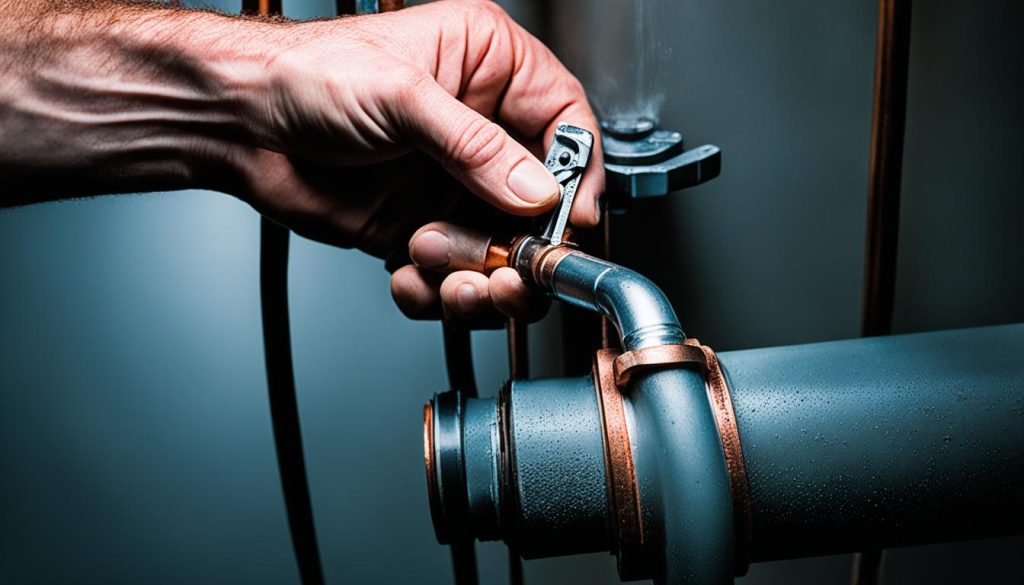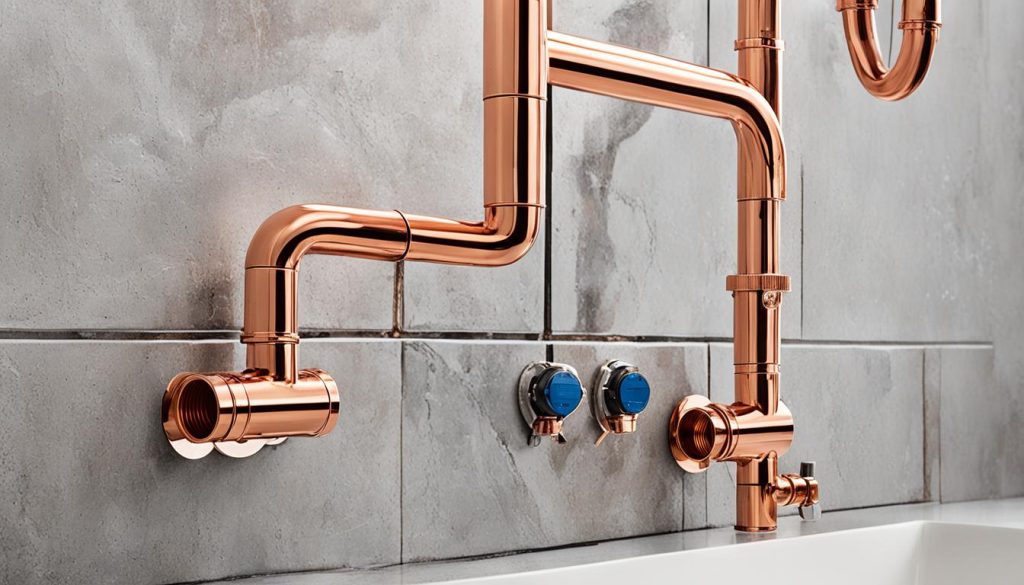Copper Plumbing: Advantages and Expert Tips
Did you know that copper plumbing pipes have an average lifespan of 50-70 years? That’s longer than most other types of plumbing materials! Not only are they durable, but copper pipes also offer a range of other benefits that make them a popular choice among homeowners.
Key Takeaways:
- Copper plumbing pipes have an average lifespan of 50-70 years, making them highly durable.
- Copper pipes can withstand high pressure and are resistant to corrosion and freezing.
- They are lightweight and easy to install, making the process more convenient.
- Copper plumbing is environmentally friendly and can be recycled.
- However, copper pipes can be more expensive than plastic alternatives and may add a metallic taste to the water.
The Benefits of Using Copper Plumbing Pipes
When it comes to durable and reliable plumbing systems, copper plumbing pipes are a top choice. These pipes are designed to withstand high pressure and resist corrosion, offering numerous benefits for homeowners. Let’s explore the advantages of using copper plumbing pipes:
1. Durability
Copper plumbing pipes are renowned for their longevity. With an average lifespan of 50-70 years, these pipes can outlast many other materials. Their durable nature ensures that your plumbing system remains intact and functional for decades, providing peace of mind and reducing the need for frequent replacements or repairs.
2. Pressure Resistance
One of the key advantages of copper plumbing pipes is their ability to withstand high water pressure. They can handle pressure up to 1000 psi, making them ideal for homes with demanding water supply needs. Whether you have a large household or require strong water flow, copper pipes can deliver the performance you need.
3. Corrosion Resistance
Unlike some other plumbing materials, copper pipes are highly resistant to corrosion. This means they won’t rust or corrode over time, ensuring your plumbing system remains in optimal condition. Copper’s natural resistance to corrosion also reduces the risk of leaks and pipe failures, saving you from potential water damage and costly repairs.
4. Eco-Friendly
Choosing copper plumbing pipes is an eco-friendly decision. Copper is a recyclable material, which means that once the pipes have served their purpose, they can be recycled and repurposed instead of ending up in landfills. By opting for copper plumbing, you contribute to the conservation of resources and reduce the environmental impact of your plumbing system.
5. Easy Installation
Copper plumbing pipes are lightweight and highly malleable, making them easy to work with during the installation process. Their flexibility allows for precise fitting and bending, ensuring a secure and leak-free connection. Additionally, the lightweight nature of copper pipes simplifies transportation and handling, making the installation process more efficient.
6. Water Quality
Copper pipes are less likely to contaminate water compared to other types of metal pipes. They don’t release harmful substances into the water supply, ensuring clean, safe, and reliable water for you and your family.
Overall, copper plumbing pipes offer durability, pressure resistance, corrosion resistance, and eco-friendliness. Their long-lasting performance makes them a valuable investment for your home’s plumbing system.
Drawbacks of Using Copper Piping
While copper piping offers numerous advantages, it’s essential to consider its drawbacks before making a decision. Below, I’ll outline the main drawbacks associated with using copper piping in your plumbing system.
1. Expensive
Copper piping can be more expensive than alternative options such as plastic piping. Both the initial purchase and installation costs of copper pipes are generally higher. However, it’s important to weigh the long-term benefits and durability of copper against the initial investment.
2. Metallic Taste
One potential downside of copper piping is its ability to add a metallic taste to the water. Some homeowners may find this taste off-putting, especially if they prefer their water to have a neutral flavor. It’s important to consider personal preferences when deciding on the type of piping for your plumbing system.
3. Cannot Withstand Acidic Water
Copper piping cannot withstand acidic water conditions. When exposed to water with high acidity levels, copper pipes can degrade over time. If you live in an area with acidic water, it’s crucial to choose a piping material that is suitable for such conditions to avoid potential issues and costly repairs down the line.
Despite these drawbacks, many homeowners still prefer copper piping due to its durability, resistance to freezing, and long lifespan. However, it’s essential to weigh the pros and cons and consider your specific needs and budget before making a decision.
Tips for Maintaining Copper Plumbing
To ensure the longevity of your copper plumbing, it’s important to follow some maintenance tips. Regular inspections by a professional plumber can help identify any potential issues early on.
Here are some key maintenance tips to keep in mind:
1. Monitor Water Pressure
Excessive water pressure can put strain on copper pipes and potentially cause damage over time. It’s recommended to invest in a pressure gauge and ensure that the water pressure stays within a safe range. If you notice any significant changes in water pressure, it’s important to contact a professional plumber to assess the situation.
2. Address Leaks and Water Quality Changes
If you notice any leaks or changes in water quality, such as a decrease in water flow or unusual odors or discoloration, it’s crucial to address them promptly. These signs may indicate underlying issues with your copper plumbing system, and contacting a professional plumber for repairs or replacements is recommended.
3. Regular Cleaning and Flushing
To maintain the performance of your copper plumbing system, regular cleaning and flushing are essential. Over time, mineral buildup can occur inside the pipes, affecting water flow and quality. Flushing the system with a mixture of water and vinegar can help remove mineral deposits and keep your plumbing system in optimal condition.
By following these maintenance tips and scheduling regular inspections with a professional plumber, you can ensure the long-lasting performance of your copper plumbing. Taking proactive measures will help prevent potential issues and extend the lifespan of your plumbing system.
Copper Plumbing Installation: Expert Tips
When it comes to installing copper plumbing, it’s essential to hire a professional plumber or experienced contractor for the job. Proper installation plays a crucial role in ensuring the integrity and performance of the plumbing system. An experienced professional will have the expertise to handle various aspects of the installation process, including connecting pipes, securing fittings, and testing for leaks.
By choosing a reputable and skilled professional, you can have peace of mind knowing that your copper plumbing installation will be done correctly and efficiently. Their knowledge and experience will help you avoid common pitfalls and ensure that all the necessary steps are followed, from planning and layout to final testing.
During the installation process, an experienced contractor will meticulously inspect the copper pipes to identify any potential issues or defects that could affect the overall performance of the plumbing system. They will also ensure that the pipes are properly connected and securely fitted to prevent leaks or water damage.
Additionally, professional plumbers have access to specialized tools and equipment that are necessary for copper pipe installation, ensuring that the job is completed with precision and efficiency. They can also provide valuable advice on maintenance and care to extend the lifespan of your copper plumbing system.
Benefits of Hiring a Professional:
- Expertise in copper pipe installation techniques
- Knowledge of proper plumbing codes and regulations
- Access to specialized tools and equipment
- Ability to troubleshoot and address potential issues
- Insurance coverage for any damages or accidents
Tips for Choosing the Right Professional:
- Research and compare local plumbing contractors
- Check customer reviews and ratings
- Verify licenses, certifications, and insurance coverage
- Request references from past clients
- Obtain detailed cost estimates and project timelines
Investing in a professional plumber or contractor for your copper plumbing installation is a wise decision that can save you time, money, and future headaches. By ensuring proper installation from the start, you can enjoy the benefits of a reliable and efficient plumbing system for years to come.
| Benefits of Hiring a Professional for Copper Plumbing Installation |
|---|
| Expertise in copper pipe installation techniques |
| Knowledge of proper plumbing codes and regulations |
| Access to specialized tools and equipment |
| Ability to troubleshoot and address potential issues |
| Insurance coverage for any damages or accidents |
*Please note that the table above is for illustrative purposes only and does not contain actual data.
Copper vs PVC Plumbing: A Comparison
When it comes to choosing the right plumbing material for your home, comparing copper and PVC is a common consideration. Both options have their own set of pros and cons, making it essential to weigh them before making a decision.
Copper plumbing pipes are known for their durability and long-lasting performance. They are resistant to corrosion and can withstand high pressure, making them suitable for both hot and cold water systems. On the other hand, PVC pipes are more cost-effective and easy to install. They are commonly used for cold water applications and offer a budget-friendly solution.
While copper pipes are generally more expensive upfront, they have a longer lifespan and are less likely to require frequent repairs. PVC pipes, on the other hand, are affordable and easy to handle during installation. However, they may not last as long as copper pipes and may require more maintenance over time.
The choice between copper and PVC ultimately depends on factors such as your budget, preferences, and specific plumbing needs. If you’re looking for a long-lasting and sturdy option, copper plumbing is the way to go. If cost-effectiveness and easy installation are your priorities, PVC plumbing may be the right choice for you. Consider the pros and cons of each material before making a decision that aligns with your requirements and budget.
Source Links
- https://www.wmhendersoninc.com/blog/plumbing-tip-pros-and-cons-of-copper-piping/
- https://www.hillcrestplumbingandheating.com/b/what-you-should-know-about-copper-pipes
- https://www.newgenerationplumbingcontractor.com/health-benefits-of-using-copper-pipes/
- Investing Wisely: How Windows & Doors in Boost Property Value and Financial Health - April 24, 2025
- The Financial Impact of Personal Injuries: Why Legal Help Matters for Business Owners - April 16, 2025
- The Hidden Financial Costs of Domestic Assault: What Business Owners Need to Know - April 16, 2025













